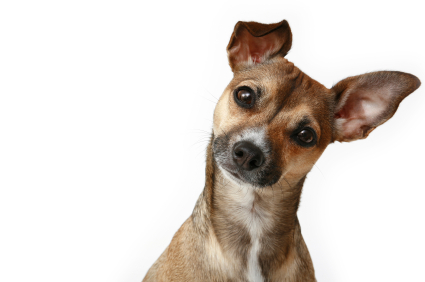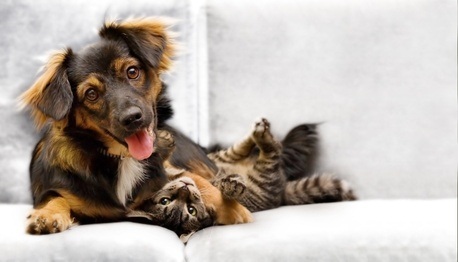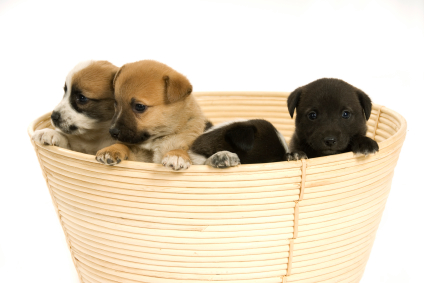The education of the puppy
 The ideal age for the adoption of a puppy is located in the around of 2 month. At this age, his mother has instilled it some foundations of education. His adoptive family will then continue this education so that a harmonious relationship be established between the dog and its new "Pack".
The ideal age for the adoption of a puppy is located in the around of 2 month. At this age, his mother has instilled it some foundations of education. His adoptive family will then continue this education so that a harmonious relationship be established between the dog and its new "Pack".
Knowledge of some data concerning the development of the puppy will allow to avoid some mistakes sometimes at the origin of a misunderstanding between the puppy and his masters and to limit the risk of appearance of certain behavioural disorders in animals.
These elements are even more important to know if you have adopted a very young puppy (deceased mother or who deserted its small, Puppy from a shelter…) because his mother will not necessarily then able to deliver basic education.
1. The attachment of the puppy to the family
At birth, the puppy is strongly committed to mother. This attachment will allow little to explore his environment without apprehension and to learn to communicate with other dogs of the Pack. Arriving in his new home, Naturally, the puppy will recreate this particular link with one of the members of the family, link that will enable him to understand his new environment of life without fear.
When the puppy reaches the age of 4 to 8 month, the bitch "detaches" from him so that it binds with all members of the Group and no longer only mother. This step is necessary to make the dog able to live without the constant presence of his mother.
It is the same within the home : setting up a 'secondment' will allow the dog to stay alone at home without anxiety and explore various situations without the need for a permanent visual contact with one of its owners.
This detachment is leaving the only puppy at home on periods gradually more longer and learn him to no longer follow the owner to which it is attached around the House (for example, teach the puppy to stay alone in her basket, the time of a film, without that it can observe what are doing his masters at the salon…)
2. The discovery of the outside world
 The exploration of the external environment and the encounter with a large number of species is essential for the good development of the puppy.
The exploration of the external environment and the encounter with a large number of species is essential for the good development of the puppy.
A puppy will present anxiety and fear facing any thing he met in the course of its 3 first months of life. It is therefore very important to discover a very rich environment, This at its inception, to be able to adapt to new situations than later. For this, It should be out very frequently, in environments the most various possible so that he gets used to all kinds of external noise, to all kinds of objects, that he faces a maximum of beings different humans (children, Youth, older people with a cane, persons in uniform…) as well as a maximum of animal species (dogs, cats, rodents, cows…)
This step is particularly important if the puppy comes from a poor stimulus environment ( Puppy from a Kennel, high isolated in the countryside…)
This adaptation to the outside world is essential for the correct development of your puppy. Dogs have not been accustomed to their future living environment become very fearful and can develop many kinds of disorders:
– A delay in acquisition of cleanliness can occur because the puppy monitors with anxiety everything is happening outside and dares to be its needs that once back at home, environment where he feels safe.
– Aggressive behavior can also be observed in these pups: they attack, by fear, objects or persons that him inspire great fear.
3. The contacts with the puppy and games
 From the age of 1 month, the bitch, during the games, learns to her puppies, When they exceed a certain threshold of excitation, to calm down . It also teaches them to not hurt others during fun sessions.
From the age of 1 month, the bitch, during the games, learns to her puppies, When they exceed a certain threshold of excitation, to calm down . It also teaches them to not hurt others during fun sessions.
To do this, It immobilizes the puppy on the back facing any behavior it considers excessive.
At the age of 2 month, the puppy should absolutely be able to calm down after a phase of excitement and do not bite and hurt when he plays:
It is not "normal" that a puppy chews without holding his bite and it lets you traces on the arms or legs when he plays with you.
It is therefore necessary, the adoption of the dog, continue to teach him to be "controlling":
– If the puppy bites during the game, give it a short order:'no' and immediately stop the game
– Avoid biting games
– Avoid traction games that taught him to "take the bite"
It is not always easy to communicate with his dog as might be his mother. It may be very interesting to put your puppy regularly in contact with a well balanced adult dog. Will then teach it the rules of life in the community and will know the limits to not cross (in the game for example).
4. The place of the puppy in her new family
Everything as in a pack of dogs, a 'hierarchy' must take place in the new family of the puppy so feel comfortable.
In a Pack, adults learn certain rituals to the puppy to enforce its hierarchical status. These rituals involve the access to food, instead of sleeping and contacts between different individuals of the "Pack". How the dog will collect within the family will therefore depend on prerogatives to which he would be entitled.
A few simple rules can limit the risk of seeing the dog become "dominating".
– access to food : the meal of the puppy must take place in a quiet place, After that masters and the Bowl must be removed 15 minutes after the beginning of each meal. The animal must, Furthermore, get anything "at table" .
– The space management : a specific place must be attributed to the puppy to sleep. This sleeping place should be a quiet place, outside the places of passage (the dog should not "monitor" what do the members of the family) and no one should it disturb.
– The contact management : Owners must, as much as possible, be at the initiative of the interactions between them and the dog. They decide the time of games, moments of "break caresses", hours output (except when the puppy is being potty and he manifests the desire to do his business outside).
– The management of sexuality : Duplication (that they are made on the legs of the masters or objects) should be banned.
5. The potty training
The acquisition of cleanliness among the puppy requires learning.
Here are some tips that will help you to teach him to do his business outside:
– The potty training must be done in a quiet environment
– The puppy usually poops in his wake, After a meal or after a moment of strong excitation. These three periods are therefore preferred to exit your puppy moments
– The puppy is very receptive to rewards: We must therefore accompany him during his outings to congratulate him warmly when he poops out. It will thus prompted to make outside rather than inside the.
– The puppy should not return as long as it does not needs, Similarly, should not go after sub penalty see the dog do its as late as possible needs to extend the promenade…
Behaviors to avoid:
– Punish the dog subsequent or him "to put the inside nose" has no interest ( the dog does not understand what is alleged against him). On the contrary, This behavior is likely to encourage the puppy to conceal its needs and make anxious ( For example, led you to scold it every morning, It could then urinate out of fear just at the moment where meant you to get up…)
You can however tell him 'no' and remove it quickly if you see preparing to urinate.
– Learning "in the journal' is deprecated. It is very difficult for the puppy to understand that the withdrawal of the journal, there suddenly more entitled to a specific place of habitation where it was possible to make its needs until there.
Cleanliness must be obtained no later than at the age of 5 month. If this is not the case, This may be a little behavioral disorder that retards this learning. Do not hesitate to talk to your veterinarian who will be able to diagnose the disorder and offer you solutions.
‴
The non-acquisition of some bases of education may be at the origin of the appearance of various disorders in the puppy: "unusually nervous" animal, hyperactive, fearful dog, aggressive, which does not support to stay alone or even dog which fails to become clean…
During the first vaccination consultation of your puppy, the veterinarian will perform a few simple tests that will enable it to ensure the correct development of your pet or, on the contrary, highlight any abnormalities. It will offer, in this case, advice targeted to eliminate these abnormal behaviour or treatment if detected anomalies are more marked.
© Copyright Vetup 2011
